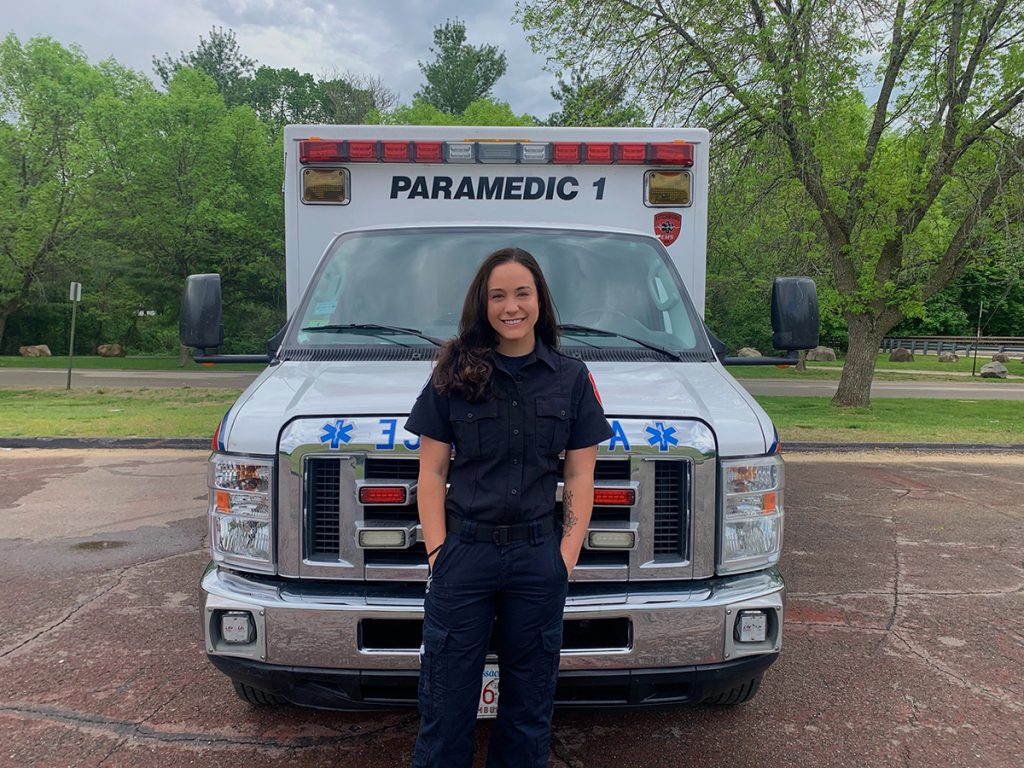#ClarkTogether
EMT Kendyll Smith ’21 answers the call against COVID-19

When the COVID-19 pandemic first presented itself, EMT-A Kendyll Smith ’21 and her crew shared an unspoken understanding that they would eventually come into contact with the virus — they just didn’t know when.
Smith, a biochemistry and molecular biology major at Clark University, was working a shift for MedStar Ambulance when she and her partner were dispatched for a patient suffering from chest pain. They evaluated the distraught patient, who disclosed that their significant other had just tested positive for COVID-19. The person feared they also had the virus.
“After they said those words it was as if the world was moving in slow motion — the entire crew was working in close proximity to the patient and were not wearing full protective equipment. This was toward the beginning of the pandemic and extra protection was not yet required,” Smith recalls.
It was nerve-racking. Fortunately, Smith later tested negative for the virus.
“I did not think that I would ever be working during a global pandemic, but when I got this job I signed up to help people,” she says. “Those on the front line take things day by day and constantly adapt to changes, all while working in less than ideal conditions.”
Smith got her start as an EMT through Clark University Rapid Response — a student-run organization that trains volunteers as certified first responders and emergency medical technicians. Members of the crew are available 24/7 to assist with medical emergencies on campus and during University events. Smith was later hired as an EMT with MedStar Ambulance and answers 911 calls primarily out of Fitchburg.
“When I got the opportunity to take the EMT-Basic course, I instantly fell in love with it,” Smith says. “I don’t think I would’ve done that if I hadn’t gone to Clark.”
She’s since become certified as an Advanced-EMT and works with a paramedic, which allows her to respond to more serious calls.
When the COVID-19 pandemic worsened, Smith and her colleagues were required to wear N95 masks on every call. Now, they also take the time to dress in personal protective equipment, including gowns and face shields before treating patients.
Smith has witnessed a shift in behavior among the general public. Most people are no longer calling 911 for minor problems out of fear of contracting the virus, and many patients now wait outside for the ambulance to arrive rather than expose the crew to other sick people inside their homes.
First responders are reluctant to admit they’re worried about contracting the virus, she says, though several of her coworkers have expressed growing fears of bringing COVID-19 home to their families. In response, Smith and her roommate opened their Worcester apartment to any colleagues in need of a place to stay or shower before heading home.
“Some of my coworkers have made the tough decision to refrain from seeing their families since the beginning of the pandemic and have been staying in isolation,” she notes.
Smith has witnessed more than her fair share of bleak moments during the pandemic, including families who are unable to accompany their loved ones to the hospital. But one memory stands out as being particularly uplifting: She was able to transport a recovered COVID-19 patient home from the field hospital set up inside Worcester’s DCU Center.
“Everybody clapped,” she recalls. “It was nice to see them get to go home. Everyone was very excited because they had been there for quite a bit.”
Although her job is far from easy, Smith says her work as a first responder during the pandemic has reinforced her desire to attend UMass Medical School and specialize in emergency medicine.
“I’ve always wanted to go into emergency medicine,” she says. “This whole situation has only solidified that for me.”


